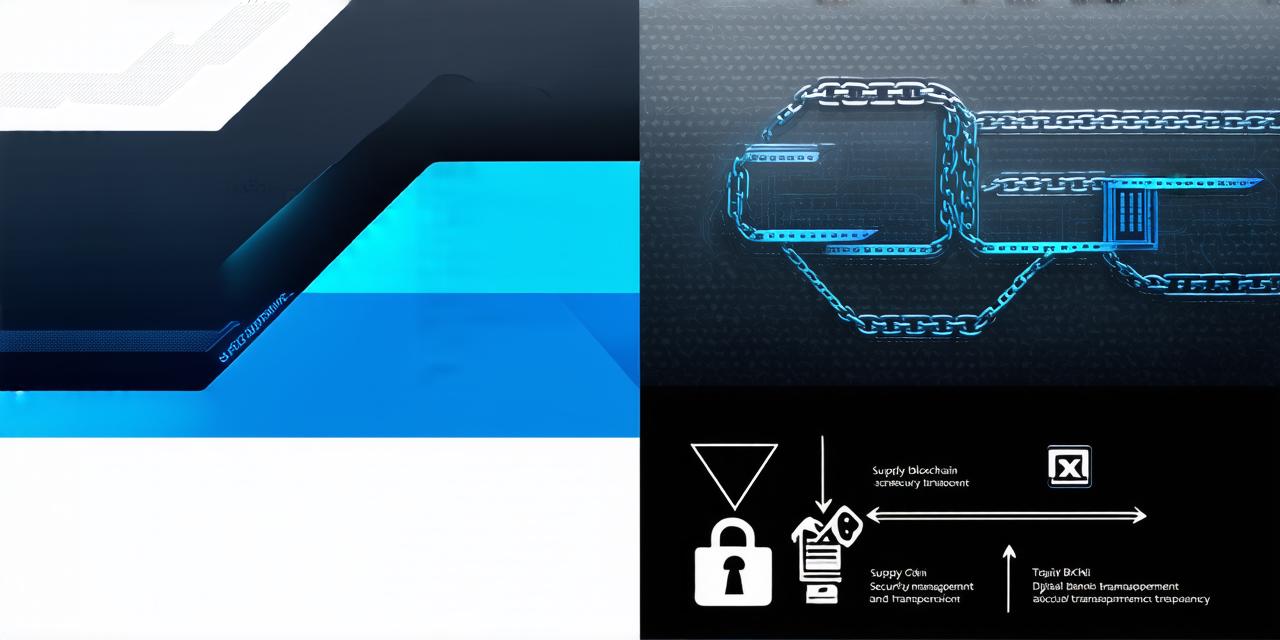Corrected HTML code:Introduction
Blockchain technology has been gaining significant traction in recent years, especially in the financial industry. However, its potential applications extend far beyond just finance. One such application is supply chain management (SCM). In this article, we will explore the benefits of blockchain in SCM and provide real-life examples and case studies to illustrate how it can be used by developers.
What is Blockchain?
Before diving into the benefits of blockchain in SCM, let’s first define what blockchain is. Blockchain is a decentralized digital ledger that records transactions across multiple computers. It is secured through cryptography and is resistant to fraud and tampering. The most well-known example of blockchain is Bitcoin, but its applications go beyond just finance.
Benefits of Blockchain in SCM
1. Increased Transparency and Traceability
One of the key benefits of blockchain in SCM is increased transparency and traceability. With blockchain, all transactions are recorded on a public ledger that can be accessed by anyone. This means that all parties involved in the supply chain can see the same information, reducing the likelihood of fraud and miscommunication. Additionally, each transaction is linked to the previous one, creating an immutable record that cannot be altered.
For example, Walmart has implemented a blockchain-based system for tracking the origin of food products in its supply chain. This system allows Walmart to trace the movement of food from farm to store, ensuring that it meets safety and quality standards. By using blockchain, Walmart can quickly identify any contaminated products and remove them from shelves, reducing the risk of foodborne illnesses.
- Improved Efficiency and Speed
Blockchain technology can also improve efficiency and speed in SCM. Traditional supply chains involve multiple intermediaries, such as brokers and banks, which can slow down the process of transferring goods from one party to another. With blockchain, transactions can be processed instantly and directly between parties, reducing the need for intermediaries.
For example, Maersk has implemented a blockchain-based system for tracking the movement of cargo in its supply chain. This system allows Maersk to track shipments in real-time, eliminating the need for manual processes such as paperwork and invoicing. By using blockchain, Maersk can reduce the time it takes to process transactions from days to minutes, improving efficiency and reducing costs. - Enhanced Security and Protection
Blockchain technology is also highly secure, making it an ideal solution for SCM. With blockchain, all transactions are encrypted and stored on a decentralized network, reducing the risk of data breaches and cyber attacks. Additionally, because each transaction is linked to the previous one, it is extremely difficult to alter or delete any information.
For example, IBM has implemented a blockchain-based system for tracking pharmaceuticals in its supply chain. This system allows pharmaceutical companies to track the movement of drugs from manufacturer to patient, ensuring that they are stored and transported correctly. By using blockchain, IBM can ensure the integrity of drug supplies and prevent counterfeit drugs from entering the market.Case Studies
- Food Trust
Food Trust is a blockchain-based system developed by IBM for the food industry. The system allows food manufacturers, retailers, and regulators to track the movement of food products in real-time, ensuring that they are safe and meet quality standards.
For example, Nestle has implemented Food Trust in its supply chain for baby food. By using the system, Nestle can track the origin of each ingredient in its baby food, ensuring that it meets safety and quality standards. Additionally, if there is a recall or contamination issue, Nestle can quickly identify affected products and remove them from shelves. - Provenance
Provenance is a blockchain-based system developed by Gem for the fashion industry. The system allows fashion brands to track the movement of their products in real-time, ensuring that they are made ethically and sustainably.
For example, Stella McCartney has implemented Provenance in its supply chain for its leather products. By using the system, Stella McCartney can track the origin of each piece of leather, ensuring that it comes from ethical and sustainable sources. Additionally, if there is a quality or safety issue with a product, Stella McCartney can quickly identify affected products and remove them from shelves. - MediLedger
MediLedger is a blockchain-based system developed by Novi for the pharmaceutical industry. The system allows pharmaceutical companies to track the movement of drugs in real-time, ensuring that they are stored and transported correctly.
For example, Merck has implemented MediLedger in its supply chain for vaccines. By using the system, Merck can track the movement of each vaccine from manufacturer to patient, ensuring that it is stored and transported correctly. Additionally, if there is a quality or safety issue with a vaccine, Merck can quickly identify affected products and prevent them from entering the market.FAQs
- How does blockchain technology work?
- Blockchain technology is a decentralized digital ledger that records transactions across multiple computers. It is secured through cryptography and is resistant to fraud and tampering.
- What are the benefits of using blockchain in supply chain management?
- Increased transparency and traceability, improved efficiency and speed, enhanced security and protection.
- Can you provide real-life examples of how blockchain technology is being used in supply chain management?
- Walmart has implemented a blockchain-based system for tracking the origin of food products in its supply chain. Maersk has implemented a blockchain-based system for tracking the movement of cargo in its supply chain. IBM has implemented a blockchain-based system for tracking pharmaceuticals in its supply chain.
- What is Food Trust, Provenance, and MediLedger?
- Food Trust is a blockchain-based system developed by IBM for the food industry. Provenance is a blockchain-based system developed by Gem for the fashion industry. MediLedger is a blockchain-based system developed by Novi for the pharmaceutical industry.

Conclusion
Blockchain technology has the potential to revolutionize supply chain management, providing benefits such as increased transparency and traceability, improved efficiency and speed, and enhanced security and protection. By using real-life examples and case studies, we have demonstrated how blockchain technology can be used in various industries, including food, fashion, and pharmaceuticals. As developers
- Food Trust is a blockchain-based system developed by IBM for the food industry. Provenance is a blockchain-based system developed by Gem for the fashion industry. MediLedger is a blockchain-based system developed by Novi for the pharmaceutical industry.
